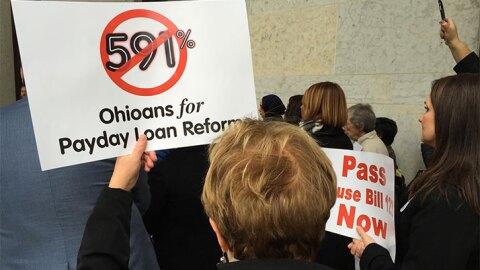It was a big year for the Ohio Supreme Court, with decisions on abortion, the death penalty and bobbleheads and the final blow to what had been the state鈥檚 largest online charter school. These and others decisions from the court were some of the stories that made headlines in 2018.
One of the biggest rulings came in February, in two cases left over from 2017.
The court decided Cleveland鈥檚 Preterm clinic didn鈥檛 have standing to sue over abortion restrictions in the 2013 budget, including a ban on transfer agreements between clinics and public hospitals. It also said Toledo鈥檚 Capital Care clinic could be shut down because it didn鈥檛 have a transfer agreement with any hospital. Abortion opponents celebrated the decision.
鈥淣o one can skirt the law. These regulations were set up to protect women, to make sure women have access to emergency care,鈥� Ohio Right to Life鈥檚 Mike Gonidakis said.
While NARAL Pro Choice Ohio鈥檚 Kellie Copeland had a different reaction.
鈥淚鈥檓 really concerned that politics is interfering in women being able to get health care that they need,鈥� Copeland said.
Toledo鈥檚 clinic was eventually reopened when it signed an agreement with a local non-profit hospital.
A week before those rulings another blockbuster case was argued, as attorneys for the state and the Electronic Classroom of Tomorrow or ECOT debated whether its funding should be based on student participation or just enrollment in the online charter school. ECOT鈥檚 attorney Marion Little sparred with Chief Justice Maureen O鈥機onnor.
鈥淓ven if a student does not attend ECOT is still entitled to the full per capita?鈥� O'Connor asked. 鈥淭hat would be the testimony of all witnesses on the enrollment methodology,鈥� Little responded. O'Connor replied, 鈥淥k let me ask you, stop. How is that not absurd?鈥�
ECOT had closed just before the case was argued, but had hoped to reopen depending on the court鈥檚 decision. However the justices ruled the state could continue clawing back $80 million in overpayments, dealing ECOT its final blow.
In April, the high court upheld the state鈥檚 death penalty law. Attorneys for 54-year old Marion killer Maurice Mason claimed that since the U.S. Supreme Court threw out Florida鈥檚 death penalty because it gave execution sentencing power to judges and not juries, Ohio鈥檚 law is also unconstitutional, because judges impose sentences.
The court unanimously sided with the state, saying the judge鈥檚 authority comes directly from the jury鈥檚 verdict. The U.S. Supreme Court has declined to consider a challenge to that ruling.
In June, the justices unanimously struck down a lower court鈥檚 decision to block state lawmakers鈥� efforts to cut state funding to cities that were not complying with a 2015 state traffic camera law. Part of that law was later found unconstitutional. But the Supreme Court agreed with Michael Hendershot from the attorney general鈥檚 office, who argued the case in April.
鈥淭he idea that any trial court can tell the Assembly not to legislate, I think, is a fairly shocking proposition,鈥� Hendershot said.
The ruling would allow Toledo to continue with its challenge to the constitutionality of the overall traffic camera law.
The court also issued two big rulings related to sports.
The justices said a brain injury lawsuit filed in Cuyahoga County against the University of Notre Dame and the NCAA can proceed, against their argument that a two-year statute of limitations prevented that.
The court sided with the widow of Steven Schmitz, who played Notre Dame football in the 1970s and died three years ago after suffering from brain diseases. Hundreds of former players have filed similar suits against the NCAA, saying it didn鈥檛 do enough to protect them from head injuries.
The court also said the Cincinnati Reds don鈥檛 have to pay the state tens of thousands of dollars in in use taxes on purchases of bobbleheads and other promotional items. Reds attorney Steven Dimengo argued that bobbleheads are exempt like any item that is actually not given away but resold.
鈥淚t鈥檚 built into the ticket price. That鈥檚 the core of the issue. Because that鈥檚 one of the acts that you have to do 鈥� you have to purchase a ticket,鈥� Dimengo said.
The opinion warns the decision might not apply to other organizations.
2018 also brought the first shakeup in the political makeup of the court in years. The only Democrat, Bill O鈥橬eill, quit in January to run in the primary for governor. Gov. John Kasich then appointed Republican Mary DeGenaro.
DeGenero was defeated in November by Melody Stewart, the first African American Democratic woman directly elected to statewide office in Ohio. And Michael Donnelly defeated Craig Baldwin to replace Justice Terrence O鈥橠onnell, so there are two Democrats on the high court for the first time since 2013.




